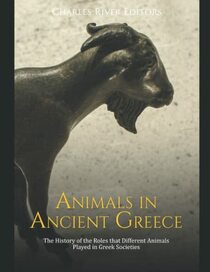Animals were not just a part of Greek life; they were an integral part. Almost every deity in the Greek pantheon was associated with a specific animal. In addition to their divine roles, animals were important sources of food, companionship, and labor and played significant roles in Greek warfare.
In ancient times, the Greek landscape was teeming with diverse wildlife. There were game and fish, deer, wolves, boar, lynx, bears, jackals, and porcupines. Other animals that are no longer in Greece were lions and Cretan goats. They also imported peacocks, parrots, white bears, cats, crocodiles, gazelles, monkeys, and camels, adding to the rich tapestry of animal life in ancient Greece.
They also imported animal parts, such as tusks, horns, and hides. These products were often given to other states or turned into medicines. When animals were captured after fighting, the winner took them as spoils of war.
A fascinating aspect of Greek thought was the perceived common border between the human and animal worlds. Animals within Greek borders were seen as Hellenic, while those outside were considered barbaric. In Greek society, animals had to serve a purpose to be kept, whether to appease a god or provide labor, reflecting their integral role in Greek culture.
Because Romans thought that animals (especially their birds and dogs) had an afterlife, they were often given a full burial. Animals were also important in religious sacrifices. Animals were sacrificed at festivals and the Olympics, and there was a public feast. This might be the only time the poor got a taste of meat.
There is considerable discussion about why the Greeks combined animals with humans to make mythological creatures. One would be the centaur.
This book bounced between fascinating facts and boring information.
In ancient times, the Greek landscape was teeming with diverse wildlife. There were game and fish, deer, wolves, boar, lynx, bears, jackals, and porcupines. Other animals that are no longer in Greece were lions and Cretan goats. They also imported peacocks, parrots, white bears, cats, crocodiles, gazelles, monkeys, and camels, adding to the rich tapestry of animal life in ancient Greece.
They also imported animal parts, such as tusks, horns, and hides. These products were often given to other states or turned into medicines. When animals were captured after fighting, the winner took them as spoils of war.
A fascinating aspect of Greek thought was the perceived common border between the human and animal worlds. Animals within Greek borders were seen as Hellenic, while those outside were considered barbaric. In Greek society, animals had to serve a purpose to be kept, whether to appease a god or provide labor, reflecting their integral role in Greek culture.
Because Romans thought that animals (especially their birds and dogs) had an afterlife, they were often given a full burial. Animals were also important in religious sacrifices. Animals were sacrificed at festivals and the Olympics, and there was a public feast. This might be the only time the poor got a taste of meat.
There is considerable discussion about why the Greeks combined animals with humans to make mythological creatures. One would be the centaur.
This book bounced between fascinating facts and boring information.




